Blog
Fuel for the Fire
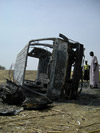
If you have read any of Enough’s recent analyses on Chad, you know by now that the brutally repressive Chadian government (led by desert rebel commando turned president Idriss Déby) is prone to spending millions of dollars on arms instead of social services and then leaving its impoverished citizens to fend for themselves. The latest sobering example of this trend is the government’s unexpected announcement last week of a complete ban on the use of charcoal, which the government said is intended to curb desertification in the arid Sahel region of Central and West Africa. Efforts to combat the effects ...
Beijing’s Bad Idea
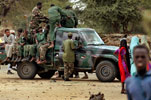
It sounds like the Chinese may again be mounting an effort at the UN to push for invoking Article 16 to suspend the war crimes investigation of Sudanese President Bashir. This should be a no-brainer for the new Secretary of State, Hillary Clinton, and U.N. Ambassador, Susan Rice, to swat down. The Sudanese Government has done nothing to advance the cause of peace in Darfur, and its forces continue to mount bombing raids in Darfur as recently as yesterday, in violation of any number of existing agreements. When will Beijing understand that being a defense lawyer for Africa’s tyrants is ...
Somalia: Rushing to New Risks in Somalia
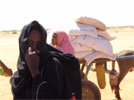
A rushed political process in Somalia now risks undermining the very unity government it seeks to promote and may inadvertently give momentum to radical Islamists. Somali political figures are meeting this week in Djibouti in an effort to select a new, more inclusive Transitional Federal Parliament and a new President to replace Abdullahi Yusuf, who resigned under pressure in December 2008. This is a positive development, and if successful would represent an important step forward in promoting reconciliation and strengthening the role of political moderates while helping to marginalize hardliners and jihadists. Given the importance of this exercise, it must ...
Stephen Lewis on Women and Peace
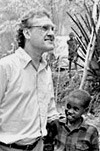
I and several of my colleagues attended the annual gather of the Institute for Inclusive Security several days ago. The keynote remarks were given by Stephen Lewis. Lewis is a very dynamic speaker. I may not agree with all of his policy recommendations, but what he has to say is provocative, thoughtful and very well worth a read. Lewis notes that since October 2000 there have been at least 35 major peace negotiations, “and not a single woman played the role of lead mediator in any of the negotiations.” ...
Enter the Peacemakers
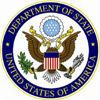
The Obama Administration is in its earliest days, but it was certainly encouraging to see the President make an early visit to Foggy Bottom and the State Department. Many within the State Department feel the role of diplomacy had been increasingly marginalized over the last eight years, and the visit by Obama and Vice President Biden was clearly meant to change the tone. It is also telling that the President and Secretary of State Clinton used the moment to unveil two heavy hitter special envoys Ambassador Richard Holbrooke (for Afghanistan-Pakistan issues) and former Senator George Mitchell (for the Middle East) ...
Don’t Leave Chad Hanging
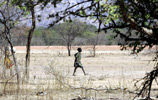
Here’s another one for the “we hope the Obama administration takes a more nuanced approach to foreign policy” file. A coalition of organizations recently released a set of policy recommendations on how the United States can better address the crisis in Chad. Their recommendations largely echo what Enough has long been arguing—that although the violence in eastern Chad is in part a spillover from neighboring Darfur, Chad is mired in its own unique political crisis, and the international community needs to be much smarter in developing a practical roadmap toward lasting stability in Chad. My colleagues Omer Ismail and Maggie ...
Listening to Survivors of Sexual Violence
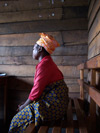
The Woodrow Wilson International Center for Scholars recently hosted a panel discussion examining the dynamics of the widespread sexual violence occurring in eastern Congo. Michael VanRooyen and Jocelyn Kelly of the Harvard Humanitarian Initiative discussed their ongoing study on the root causes of sexual violence in eastern Congo. In addition to documenting the “medical, psychosocial, and livelihood” needs of the survivors of sexual violence in Congo, the study—undertaken in partnership with Panzi Hospital, in Bukavu, eastern Congo—assesses community perceptions of sexual assault and seeks to understand the motivation of perpetrators. In the effort to help Congolese women to rebuild their ...
The Stunning Developments in Eastern Congo – What Do They Mean?

In a dramatic reversal of fortune for one of Central Africa’s most powerful warlords, Congolese rebel leader Laurent Nkunda was arrested by Rwandan authorities last night along the Congo-Rwanda border. When my colleague Rebecca and I met with Nkunda in the town of Rwanguba on Thanksgiving Day, he seemed on top of the world. His rebel movement, the National Congress for the Defense of People, or CNDP, had routed the Congolese army, embarrassed UN peacekeepers, consolidated control of a large swath of North Kivu province, and threatened the regional capital of Goma. Nkunda shrugged off allegations that his lieutenant, Bosco ...
“Nothing about us without us:” Women and Peacemaking
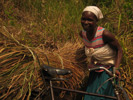
The innovative Institute for Inclusive Security, which includes the equally impressive Women Waging Peace Network, hosted its tenth annual Policy Forum today in Washington. The forum marked the end of a colloquium that brought together 21 women leaders from 12 conflict and post-conflict areas around the world, from Kashmir to Southern Sudan to Northern Uganda. These champions of women’s rights are coordinating their efforts around the powerful idea of “inclusive security”: the notion that women should and must be included as stakeholders—not “afterthoughts,” in the words of one Forum panelist—in efforts to avert violence and resolve conflict. Too often, in ...
Sudan Challenges
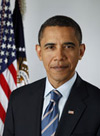
In case you missed it: The Enough Project, in partnership with the Save Darfur Coalition and the Genocide Intervention Network, yesterday released the second installment in a series of letters to President Barack Obama spelling out a practical roadmap to end the crisis in Sudan. The first letter called on then President-elect Obama to lead a concerted international “peace surge” for Sudan. The second letter, President Obama’s Immediate Sudan Challenge, focuses on the urgent United States policy imperatives in Sudan. Co-authored by Enough’s John Prendergast and John Norris and the Save Darfur Coalition’s Jerry Fowler, the letter outlines several key ...

